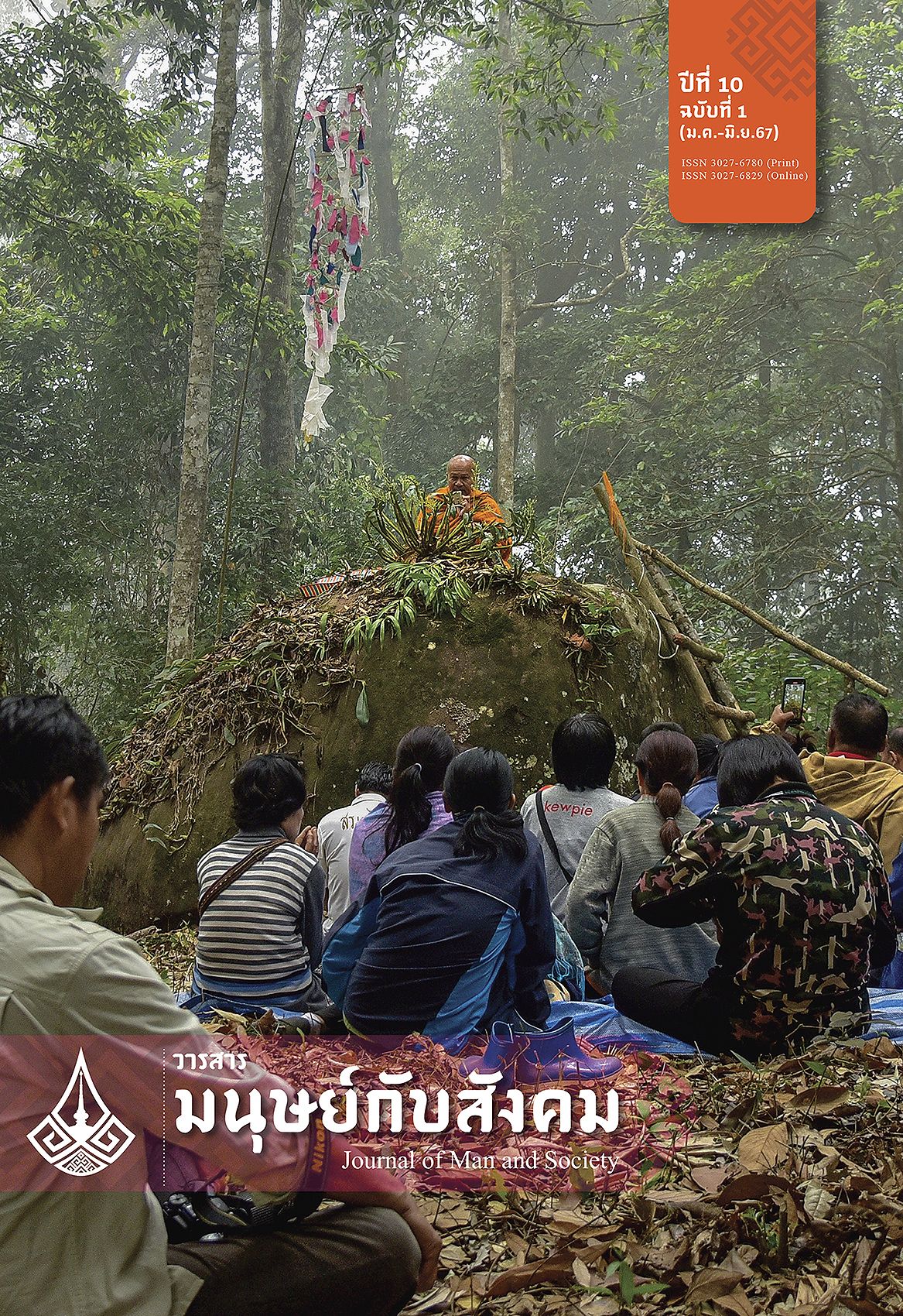ภูมิปัญญาการสอนบุตรตามพุทธวิธีทางการสอนจาก เรื่องสามก๊ก ฉบับเจ้าพระยาพระคลัง (หน) ในบริบทสังคมศตวรรษที่ 21
Main Article Content
บทคัดย่อ
บทความนี้มีวัตถุประสงค์เพื่อศึกษาภูมิปัญญาการสอนบุตรตามพุทธวิธีทางการสอนจากเรื่องสามก๊ก ฉบับเจ้าพระยาพระคลัง (หน) ในบริบทสังคมศตวรรษที่ 21 โดยใช้แนวคิดเรื่องพุทธวิธีทางการสอนของ พระอัครเดช ญาณเดโช ข้อมูลที่ใช้ศึกษามาจากวรรณกรรมสามก๊ก ฉบับเจ้าพระยาพระคลัง (หน) ผลการศึกษาพบว่าภูมิปัญญาด้านกลวิธีการสอนบุตรตามวิถีพุทธวิธีทางการสอนจากเรื่องสามก๊กในบริบทสังคมศตวรรษที่ 21 ได้แก่ 1) การใช้อุปกรณ์ในการสอน 2) การลงโทษและให้รางวัล 3) การเปรียบเทียบด้วยข้ออุปมา 4) การทำเป็นตัวอย่าง 5) การสอนแบบเล่าเหตุการณ์ประกอบ 6) การเล่นภาษา เล่นคำ และใช้คำในความหมายใหม่ 7) การใช้อุบายเลือกคน และการปฏิบัติรายบุคคล 8) การรู้จักจังหวะและโอกาส 9) การรู้จักความยืดหยุ่นและการใช้วิธีการ และ 10) การรู้จักกลวิธีแก้ปัญหาเฉพาะหน้า จากที่กล่าวมา ล้วนแสดงให้เห็นถึงความสำคัญของวรรณคดีเรื่องสามก๊ก นอกจากจะได้รับการยกย่องจากวรรณคดีสโมสรให้เป็นยอดของวรรณคดีประเภทนิทานที่ให้ความสนุกสนานเพลิดเพลินแล้ว ยังเป็นยอดด้านภาษาหรือมีสำนวนภาษาไพเราะลึกซึ้งกินใจ ในเรื่องสามก๊กยังมีภูมิปัญญาการสอนบุตร ให้แง่คิด คำคม คติเตือนใจ คุณธรรมแฝงอยู่ ถือเป็นสิ่งที่ทรงคุณค่าในการศึกษาที่สามารถประยุกต์ใช้ในการเลี้ยงดูแลบุตรในบริบทสังคมศตวรรษที่ 21 ได้เป็นอย่างดี
Article Details

อนุญาตภายใต้เงื่อนไข Creative Commons Attribution-NonCommercial-NoDerivatives 4.0 International License.
เนื้อหาและข้อมูลที่ตีพิมพ์ลงในวารสารมนุษย์กับสังคม ถือเป็นข้อคิดเห็นและความรับผิดชอบโดยตรงของผู้เขียนซึ่งกองบรรณาธิการวารสารไม่จำเป็นต้องเห็นด้วยหรือร่วมรับผิดชอบใดๆ
บทความ ข้อมูล เนื้อหา รูปภาพ ฯลฯ ที่ได้รับการตีพิมพ์ในวารสารมนุษย์กับสังคม ถือเป็นลิขสิทธิ์ของวารสาร หากบุคคลหรือหน่วยงานใดต้องการนำทั้งหมดหรือส่วนหนึ่งส่วนใดไปเผยแพร่ต่อหรือเพื่่อกระทำการใดๆ จะต้องได้รับอนุญาตเป็นลายลักษณ์อักษรจากวารสารมนุษย์กับสังคมก่อน
เอกสารอ้างอิง
กัลปังหา โชสิวสกุล. (2543). ผลการใช้การเรียนรู้แบบมีส่วนร่วมต่อบทบาทของบิดาในการส่งเสริมพัฒนาการทางอารมณ์ และทางสติปัญญาแก่บุตรปฐมวัย อำเภอหนองม่วง จังหวัดลพบุรี. [วิทยานิพนธ์ปริญญาวิทยาศาสตรมหาบัณฑิต ไม่ได้ตีพิมพ์]. มหาวิทยาลัยมหิดล.
เจ้าพระยาพระคลัง (หน). (2555). สามก๊ก ฉบับเจ้าพระยาพระคลัง (หน) (พิมพ์ครั้งที่ 2). แสงดาว.
ปัณณพร พิมพ์วรรณ. (2554). สร้างลูกให้รู้ทันโลก. สำนักพิมพ์เบสบุ๊ค.
พงษ์ ผาวิจิตร. (2552). ธุรกิจปั้นลูก ธุรกิจที่ย้อนกลับมาทำใหม่ไม่ได้ ถ้าไม่ทำตั้งแต่วันนี้. บริษัทพิมพ์ดี จำกัด.
พระณัฐัญ ธมฺมทินฺโน และ พระมหาดาวสยาม วชิรปญฺโญ. (2563). วิจารณ์หนังสือ: Book Review “พุทธวิธีในการสอน” Buddhist Methods Of Teaching. Journal of Modern Learning Development, 5(5), 348-355.
พระอัครเดช ญาณเตโช. (2566, 12 กุมภาพันธ์). พุทธวิธีในการสอนของพระพุทธเจ้า. ฝ่ายบริการเผยแพร่ทางไกล สำนักการศึกษาต่อเนื่อง มหาวิทยาลัยสุโขทัยธรรมาธิราช. https://www.stou.ac.th/study/sumrit/7-59(500)/page1-7-59(500).html
พูนสุข ช่วยทอง. (2548). ครอบครัวและคุณภาพเด็ก. โรงพิม์วิฑูรย์การปก.
วิจารณ์ พานิช. (2560). ศาสตร์และศิลป์ของการสอน. ภาพพิมพ์.
วีรสิฏฐ์ วงษ์นุกูล. (2565, 13 มิถุนายน). ลกเจ๊กจากหนังสือภาษาไทย. สามก๊กวิกิ. http://www.samkokwiki.com.
ฮกหลง. (2565, 2 มิถุนายน). สามก๊กวิกิ สุดยอดวรรณกรรมสามก๊ก บทวิเคราะห์ข้อมูลแผนที่ประวัติตัวละคร. สามก๊กวิกิ. http://www.samkokwiki.com.
MamaExpert Team. (2566, 14 กุมภาพันธ์). สุดยอดเคล็ดลับการเลี้ยงลูกในศตวรรษที่ 21. MamaExpert. http://www.mamaexpert.com/posts/content-5080.
Teerapong Sanguoyanyi. (2558, 15 ธันวาคม). สามก๊กในบทเรียนวิชาภาษาไทย. https://m.facebook.com/100001852568249/albums/a.774346375970441/สามก๊กในบทเรียนวิชาภาษาไทย.


